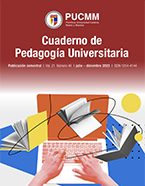Collegial professional development from teaching innovation projects: a shared background
DOI:
https://doi.org/10.29197/cpu.v21i40.507Keywords:
Innovation, professional development, teaching competences, learning communityAbstract
This paper presents some results obtained through the innovation projects carried out during the last seven years in the Teaching Innovation Group (EIE-GID) of the University of Murcia, with the aim of analyzing the evaluations of the teachers participating in the experiences from the perspective of their contribution to the teaching skills expected of a university professor, as well as their contributions to the collegial professional development of the members of the EIE-GID. The results found show that, although the projects described are centred on active methodologies and the assessment of teaching competences, progress in professional teaching competences has been observed in their implementation and evaluation. In this scenario, teaching professional development has ceased to be an individual activity and has become a collective activity, the result of group, coordinated, collegiate and reflective work.
Metrics
References
Bolarín, M.J., Moreno, M.A. y Martín, C. (2015). De la coordinación a la interdisciplinariedad: voces del alumnado. Revista de docencia e investigación, 25(2), 105-123. https://revista.uclm.es/index.php/rdi/article/view/744
Bolarín, M.J. (2016). La coordinación docente en la Universidad: análisis de la situación actual. Educatio Siglo XXI, 34(2), 167-184. https://revistas.um.es/educatio/article/view/263861
Bozu, Z. y Canto, P. (2009). El profesorado universitario en la sociedad del conocimiento: competencias profesionales docentes. Revista de Formación e Innovación Educativa Universitaria, 2(2), 87-97. https://shorturl.at/kvGRW
Burns, B. (1995). Paradigms for research in teaching. En L. W. Anderson, (Ed.). The International Encyclopaedia of Teaching and Teacher Education [La Enciclopedia Internacional de Enseñanza y Formación de Profesores] (2a ed.), (pp.17-20). Pergamon.
Day, C. (2005). Formar docentes: cómo, cuándo y en qué condiciones aprende el profesorado. Narcea.
Deverell, A. y Moore, S. (2014). Releasing creativity in teaching and learning: The potential role of organisational legitimacy and increased dialogue. Innovations in Education and Teaching International, 51(2), 164-174. https://doi.org/10.1080/14703297.2013.771968
García, Y., Herrera, J., García, M. y Guevara, G. (2015). Collaborative work and its influence on the development of teaching professional culture. Gaceta Médica Espirituana, 17(1), 60-67.
Gómez Serra, M., Escofet, A. y Freixa, M. (2014). Los equipos docentes en la educación superior. ¿Utopía o realidad? Revista Española de Pedagogía, 72(259), 509-523. https://revistadepedagogia.org/wp-content/uploads/2014/09/259-07.pdf
Guskey, T.R. (2000). Evaluating professional development. Corwin Press.
Hargreaves, A. (1996). Profesorado, cultura y postmodernidad (Cambian los tiempos, cambia el profesorado). Morata.
Hwang, S. (2008). Utilizing Qualitative Data Analysis Software: A Review of Atlas.ti. Social Science Computer Review, 26(4), 519–527. https://doi.org/10.1177/0894439307312485
Heinrich, E. (2015). Identifying teaching groups as a basis for academic development. Higher Education Research & Development, 34(5), 899-913. https://doi.org/10.1080/07294360.2015.1011091
Imbernon, F. (2011). Un nuevo desarrollo profesional del profesorado para una nueva educación. Revista de Ciencias Humanas, 12(19), 75-86.
Keevers, L., Lefoe, G., Leask, B., Fauziah, S., Ganesharatnam, S., Loh, V. y Yin, J. (2014). I like the people I work with. Maybe I’ll get to meet them in person one day: Teaching and learning practice development with transnational teaching teams. Journal of Education for Teaching, 40(3), 232-250. https://doi.org/10.1080/02607476.2014.903024
Krichesky, G. J. y Murillo, F. J. (2011). Las comunidades profesionales de aprendizaje. Una estrategia de mejora para una nueva concepción de escuela. REICE, Revista Iberoamericana Sobre Calidad, Eficacia y Cambio En Educación, 9(1), 65-83.
Lasnier, F. (2000). Réussir la formation par compétences. Guérin
Lieberman, A. (1995). The work of restructuring School: building from the ground up [El trabajo de reestructuración de la Escuela: construyendo desde cero]. Teachers College Press.
Macanchí, M., Orozco, B. y Campoverde, M. (2020). Innovación educativa, pedagógica y didáctica. Concepciones para la práctica en la educación superior. Revista Universidad y Sociedad, 12(1), 396-403. https://shorturl.at/QTUX5
Marcelo, C. (2001). Aprender a enseñar para la sociedad del conocimiento. Revista complutense de educación, 12(2), 531-593.
Mauri, T., Clarà, M., Ginesta, A. y Colomina, R. (2013). University teaching teams' contribution to workplace learning: An exploratory study. Journal for the Study of Education and Development, 36(3), 341-360. https://doi.org/10.1174/021037013807533025.
Mayor, C. y Sánchez, M. (1999). Los equipos docentes: una contribución formativa a la calidad del profesorado universitario. XXI: Revista de Educación, 1, 157-176. https://shorturl.at/pABSX
McLaughlin, M.W. y Talbert, J.E. (2001). Professional Communities and the Work of High School Teaching [Las comunidades profesionales y el trabajo de la enseñanza en la secundaria]. University of Chicago Press.
Montecinos, C. (2003). Desarrollo profesional docente y aprendizaje colectivo. Psicoperspectivas, 2, 105-128. https://dx.doi.org/10.5027/psicoperspectivas-Vol2-Issue1-fulltext-6
Núñez-López, S., Ávila Palet, J.E. y Olivares-Olivares, S.L. (2017). El desarrollo del pensamiento crítico en estudiantes universitarios por medio del Aprendizaje Basado en Problemas. Revista Iberoamericana de Educación Superior, 8, 84–103.
Tedesco, J.C. y Tenti, E. (2002). Nuevos tiempos y nuevos docentes [Conferencia]. Conferencia Regional O desmpenho dos professores América Latina e Caribe: Novas Prioridades. Brasilia, Brasil. https://shorturl.at/lEF57
Torrego, L. y Ruiz, C. (2011). La coordinación docente en la implantación de los títulos de Grado. Revista Electrónica Interuniversitaria de Formación del Profesorado, 14(4), 31–40.
Weiss, M. P., Pellegrino, A., Regan, K. y Mann, L. (2015). Beyond the blind date collaborative course development and co-teaching by teacher educators. Teacher Education and Special Education, 38(2), 88-104. https://doi.org/10.1177/0888406414548599
Published
How to Cite
Issue
Section
License
Unless otherwise indicated, all articles in this journal are published under a
Licencia Internacional Creative Commons 4.0 Atribución-NoComercial-CompartirIgual .
The authors retain the copyright and assign the right to the first publication to the magazine.









